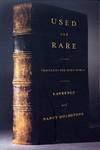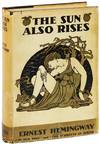

Manuscript Letter Copy Book of George Augustus Wilcox, of Madison, Connecticut, and Detroit, Michigan, Lawyer and Real Estate investor in Lumber Lands, 1878-1884
by Wilcox, George Augustus
- Used
- good
- Hardcover
- Condition
- Good
- Seller
-
Philadelphia, Pennsylvania, United States
Payment Methods Accepted
About This Item
The volume is a letter copy book, the copies are on thin tissue like paper, and according to the index contains copies of at least 213 letters, and written to at least 112 individuals, businesses, or local and state government officials. The letters deal primarily with the lumber business and the real estate investments of Wilcox.
The earliest lumbering in Michigan was done by the French in order to build forts, fur-trading, posts and missions. The British, and later the Americans, used Michigan's hardwoods to build merchant and war ships. Beginning about 1855, white pine became the most desired tree species by the lumber industry of the Great Lakes states. Navigable rivers and extensive pine forests formed the basis of a flourishing pine lumber industry in Michigan's Lower Peninsula until 1895, and about 10 years longer in the Upper Peninsula. Pine logging in the Lake States was essentially completed by 1900, following which the lumbering of hemlock and hardwood species began to gain in importance. At the time of this Letter Copy Book (1878-1884), Michigan was producing more lumber then the next three states combined. However, between 1870 and 1890, most of the useable pine timber in Lower Michigan had been cut.
Wilcox corresponds with various individuals concerning offers of land contracts, on the amount of merchantable saw timber standing on the lands, offers lumber contracts, etc., to various lumbermen, lumber jobbers, etc. He writes to the various appropriate government agents such as deed recorders, cashiers for taxes, the county and local auditors, etc.
The largest recipients of the letters are: S.S. See, West Branch, MI (25), who was in the lumber business; Register of Deeds, Lexington, Michigan (17), helping to get deeds recorded and released; George Williams (14); Auditor General of Michigan (13); R. J. Briscoe, Flint, Michigan (11), partner in Briscoe & Lockwood; Pipa & Thompson (9); Briscoe & Lockwood (8), a lumber concern in Flint; and Charles Holman (8).
Overall, an interesting look at the lumber lands real estate business in Michigan. Most of the individuals that Wilcox corresponds with are located in Michigan, in the towns of Detroit, Flint, Lapeer, Lansing, Lexington, and West Branch. Wilcox also writes to family and other individuals back home in Connecticut, or Massachusetts, Georgia, and elsewhere.
There is one letter laid in, 1 page, dated 24 January 1882, written by R. J. Briscoe, a lumber and salt merchant, to Geo. A. Wilcox. The letter is written on Briscoe's letterhead.
George A. Wilcox (1830-1928)
George A. Wilcox was a very wealthy and prominent business and real estate investor from Madison, Connecticut who owned several businesses and properties across the United States. He was born on 20 September 1830, at Madison, the son of Col. Jonathan Samuel Wilcox (1791-1875) and Chloe Hand (1791-1875) of Madison. George was the next to the last of nine children born to Chloe between the years 1816 and 1833.
He prepared for college at Lee's Academy in Madison, Connecticut, and graduated Yale College, Class of 1852, with Phi Beta Kappa honors. There were at least 17 members of the extended Wilcox family who graduated from Yale going back to Jonathan Todd in 1732 and up to Edward A. Fellowes in 1918. The Wilcox family traces their lineage back to John Wilcox and Christopher Todd, founders of Hartford and New Haven, Connecticut.
Following a year of travel in Europe after he graduated Yale, he studied law in Detroit, Michigan, and after completion was admitted to the bar. He practiced law in Georgia for 2 years, presumably going there because his brother Daniel Hand Wilcox, a merchant, was located there. Georgia was the home of Daniel's wife, Frances Louisa Ansley. After 2 years in Georgia, he gave up the South and went to Detroit, Michigan for the rest of his career.
Wilcox was very involved in real estate and had a great deal of holdings. He was also involved in the lumber industry selling lumber off of his properties. Mr. Wilcox also wrote poetry which he referred to as "Law Office Lyrics."
In 1880, he is shown living with his sister Catherine and her husband John W. Nash, at Madison, Connecticut. He was listed as single and his occupation as "broker."
Wilcox married in 1894, marrying a woman named Mary Grenelle, who was 38 years younger than he was. He was 64, his wife about 26. They had at least one child together, Constance, born in 1895. His daughter, Constance was an accomplished author and Princess by marriage to Prince Guido Pignatelli di Montecalva in 1925.
Wilcox died at Madison, Connecticut, on 22 September 1928 and was buried in his parents' family plot at West Cemetery in Madison. When he was 90 years old, he took a trip to Cuba with his second wife, who was 38 years younger than he. Three months before he died, when he was 98 years old, he took a trip to Europe with his daughter.
Reviews
(Log in or Create an Account first!)
Details
- Seller
- Michael Brown Rare Books, LLC
(US)
- Seller's Inventory #
- 030114
- Title
- Manuscript Letter Copy Book of George Augustus Wilcox, of Madison, Connecticut, and Detroit, Michigan, Lawyer and Real Estate investor in Lumber Lands, 1878-1884
- Author
- Wilcox, George Augustus
- Format/Binding
- Hardcover
- Book Condition
- Used - Good
- Quantity Available
- 1
- Weight
- 0.00 lbs
- Keywords
- Michigan, Manuscript Letter Copy Book, Americana, Business History, 19th century American Social History
- Product_type
- Handwritten
Terms of Sale
Michael Brown Rare Books, LLC
About the Seller
Michael Brown Rare Books, LLC
About Michael Brown Rare Books, LLC
Glossary
Some terminology that may be used in this description includes:
- New
- A new book is a book previously not circulated to a buyer. Although a new book is typically free of any faults or defects, "new"...
- Cloth
- "Cloth-bound" generally refers to a hardcover book with cloth covering the outside of the book covers. The cloth is stretched...
- Spine
- The outer portion of a book which covers the actual binding. The spine usually faces outward when a book is placed on a shelf....

